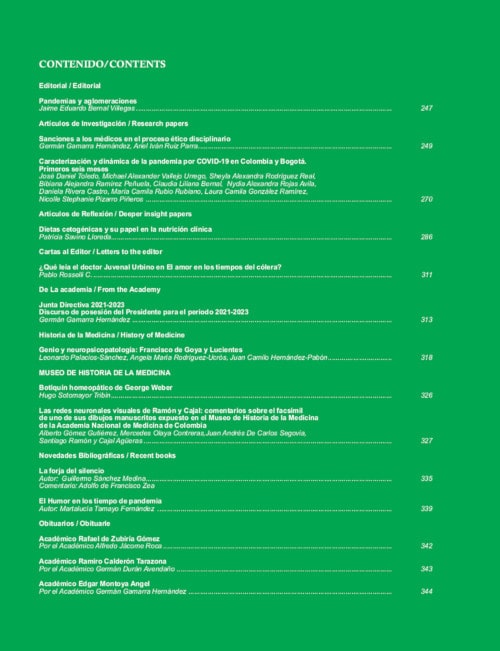Dietas cetogénicas y su papel en la nutrición clínica
DOI:
https://doi.org/10.56050/01205498.1607Palabras clave:
dieta cetogénica, dieta de Atkins, glioblastoma, cáncer, Alzheimer, Parkinson, Epilepsia, esclerosis múltiple, enfermedades neurológicas, obesidadResumen
Propósito de la revisión: La terapia médica nutricional con dieta cetogénica se ha empleado para el tratamiento de la epilepsia por casi un siglo. En la actualidad, resurge para la reducción rápida de peso y su empleo en atletas; también se ha estudiado en enfermedades como las neurológicas, el cáncer, la obesidad y la diabetes de tipo II. En esta revisión se definen los diferentes tipos de dietas cetogénicas, se explican los fundamentos metabólicos, se exploran nuevos conocimientos sobre los mecanismos relacionados en las diferentes enfermedades, y se alerta sobre sus riesgos y consecuencias. Hallazgos recientes: Se ha sugerido que las dietas cetogénicas no solo mejoran el control de las convulsiones, sino que también causan un impacto en diferentes afecciones neurológicas, pueden controlar el crecimiento tumoral y contribuyen al control de la obesidad; además, se han observado resultados diversos cuando se usan para mejorar el rendimiento en atletas y en voluntarios sanos. Discusión: Se han encontrado resultados positivos con el empleo de las dietas cetogénicas en diferentes enfermedades. Existen dificultades en la estandarización de los datos, debido a la inexactitud de la información con respecto al consumo de alimentos y al cumplimiento de la dieta a largo plazo. El número limitado de pacientes y su deserción hacen difícil la reproducción y generalización de los resultados de este tratamiento nutricional. Conclusiones: La dieta cetogénica no es inocua. Se necesita que su indicación, implementación y seguimiento estén a cargo de profesionales de la salud idóneos, quienes pueden prever los riesgos y los beneficios que se pueden obtener en cada una de las indicaciones.
Biografía del autor/a
Patricia Savino Lloreda, Centro Latinoamericano de Nutrición
Referencias bibliográficas
2. Kverneland M, Molteberg E, Iversen PO, Veierød MB, Taubøll E, Selmer K, et al. Effect of modified Atkins diet in adults with drug-resistant focal epilepsy: A randomized clinical trial. Epilepsia. 2018;59(8):1567–76.
3. Sremanakova J, Sowerbutts AM, Burden S. A systematic review of the use of ketogenic diets in adult patients with cancer. J Hum Nutr Diet. 2018;31(6):793–802.
4. Klement RJ. The emerging role of ketogenic diets in cancer treatment. Curr Opin Clin Nutr Metab Care. 2019;22(2):129–34.
5. Phillips MCL, Murtagh DKJ, Gilbertson LJ, Asztely FJS, Lynch CDP. Low-fat versus ketogenic diet in Parkinson’s disease: A pilot randomized controlled trial. Mov Disord. 2018;33(8):1306–14.
6. Brenton JN, Banwell B, Bergqvist AGC, Lehner-Gulotta D, Gampper L, LeythamE, et al. Pilot study of a ketogenic diet in relapsing-remitting MS. Neurol Neuroimmunol Neuroinflamm. 2019;6(4):e565.
7. Evcili G, Utku U, Öğün MN, Özdemir G. Early and long period follow-up results of low glycemic index diet for migraine prophylaxis. Agri. 2018;30(1):8–11.
8. Hallberg SJ, McKenzie AL, Williams PT, Bhanpuri NH, Peters AL, Campbell W, et al. Effectiveness and Safety of a Novel Care Model for the Management of Type 2 Diabetes at 1 Year: An Open-Label, Non-Randomized, Controlled Study. Diabetes Ther. 2018;9(2):583–612.
9. Ota M, Matsuo J, Ishida I, Takano H, Yokoi Y, HoriH, et al. Effects of a medium-chain triglyceride-based ketogenic formula on cognitive function in patients with mild-to-moderate Alzheimer’s disease. Neurosci Lett. 2019;690:232–6.
10. Vargas S, Romance R, Petro JL, Bonilla DA, Galancho I, Espinar S, et al. Efficacy of ketogenic diet on body composition during resistance training in trained men: a randomized controlled trial. J Int Soc Sports Nutr. 2018;15(1):31. Dhamija R, Eckert S, Wirrell E. Ketogenic diet. Can J Neurol Sci. 2013;40(2):158–67.
11. Huttenlocher PR, Wilbourn AJ, Signore JM. Mediumchain triglycerides as a therapy for intractable childhood epilepsy. Neurology. 1971;21(11):1097–103.
12. Walczyk T, Wick JY. The Ketogenic Diet: Making a Comeback. Consult Pharm. 2017;32(7):388–96.
13. Paoli A, Bianco A, Damiani E, Bosco G. Ketogenic diet in neuromuscular and neurodegenerative diseases. Biomed Res Int. 2014;2014:474296.
14. Medeiros D, Wildman R, editores. Lipids: fatty acids, triglycerides, phospholipids, and sterols. En: Advanced Human NutritionthCuarta edición. Jones & Barlett Learning; 2019. p. 111-146.
15. Mayes P. Metabolismo de lípidos. En: Harper H, editor. Manual de química fisiológica. Cuarta edición. México: Litografía Maico; 1973. p. 297–343.
16. McDonald TJW, Cervenka MC. The Expanding Role of Ketogenic Diets in Adult Neurological Disorders. Brain Sci. 2018;8(8).
17. Hipócrates. The genuine work of Hippocrates. Baltimore: Williams and Wilkins; 193p.
18. Guelpa G, Marie A. La lutte contre l’épilepsie par la désintoxication et par la rééducation alimentaire. Rev Ther Medico-Chirurgicale. 1911;78:8–13.
19. Conklin HW. Cause and treatment of epilepsy. J Am Osteopathic Assoc. 1922;26:11–4.
20. Wilder HH. Anthropometric measurements. Science. 1921;53(1358):20.
21. Martin-McGill KJ, Jackson CF, Bresnahan R, Levy RG, Cooper PN. Ketogenic diets for drug-resistant epilepsy. Cochrane Database Syst Rev. 2018;11:CD001903.
22. Hong AM, Turner Z, Hamdy RF, Kossoff EH. Infantile spasms treated with the ketogenic diet: prospective single-center experience in 104 consecutive infants. Epilepsia. 2010;51(8):1403–7.
23. Caraballo RH. Nonpharmacologic treatments of Dravet syndrome: focus on the ketogenic diet. Epilepsia. 2011;52(Suppl 2):79–82.
24. Nabbout R, Copioli C, Chipaux M, Chemaly N, Desguerre I, Dulac O, et al. Ketogenic diet also benefits Dravet syndrome patients receiving stiripentol: a prospective pilot study. Epilepsia. 2011;52(7):e54-57.
25. Caraballo RH, Cersósimo RO, Sakr D, Cresta A, Escobal N, Fejerman N. Ketogenic diet in patients with myoclonic-astatic epilepsy. Epileptic Disord. 2006;8(2):151–5.
26. Kilaru S, Bergqvist AGC. Current treatment of myoclonic astatic epilepsy: clinical experience at the Children’s Hospital of Philadelphia. Epilepsia. 2007;48(9):1703–7.
27. Lemmon ME, Terao NN, Ng Y-T, Reisig W, Rubenstein JE, Kossoff EH. Efficacy of the ketogenic diet in Lennox-Gastaut syndrome: a retrospective review of one institution’s experience and summary of the literature. Dev Med Child Neurol. 2012;54(5):464–8.
28. Nabbout R, Mazzuca M, Hubert P, Peudennier S, Allaire C, FlurinV, et al. Efficacy of ketogenic diet in severe refractory status epilepticus initiating fever induced refractory epileptic encephalopathy in school age children (FIRES). Epilepsia. 2010;51(10):2033–7.
29. Kang H-C, Lee YJ, Lee JS, Lee EJ, Eom S, You SJ, et al. Comparison of short- versus long-term ketogenic diet for intractable infantile spasms. Epilepsia. 2011;52(4):781–7.
30. Cusmai R, Martinelli D, Moavero R, Dionisi Vici C, Vigevano F, Castana C, et al. Ketogenic diet in early myoclonic encephalopathy due to non ketotic hyperglycinemia. Eur J Paediatr Neurol. 2012;16(5):509–13.
31. Nangia S, Caraballo RH, Kang H-C, Nordli DR, Scheffer IE. Is the ketogenic diet effective in specific epilepsy syndromes? Epilepsy Res. 2012;100(3):252–7.
32. Mosek A, Natour H, Neufeld MY, Shiff Y, Vaisman N. Ketogenic diet treatment in adults with refractory epilepsy: a prospective pilot study. Seizure. 2009;18(1):30–3.
33. Klein P, Janousek J, Barber A, Weissberger R. Ketogenic diet treatment in adults with refractory epilepsy. Epilepsy Behav. 2010;19(4):575–9.
34. Kossoff EH, Rowley H, Sinha SR, Vining EPG. A prospective study of the modified Atkins diet for intractable epilepsy in adults. Epilepsia. 2008;49(2):316–9.
35. Swerdlow RH. Brain aging, Alzheimer’s disease, and mitochondria. Biochim Biophys Acta. 2011;1812(12):1630– 9.
36. Wilkins HM, Swerdlow RH. Amyloid precursor protein processing and bioenergetics. Brain Res Bull. 2017;133:71–9.
37. Castellano C-A, Nugent S, Paquet N, Tremblay S, Bocti C, LacombeG, et al. Lower brain 18F-fluorodeoxyglucose uptake but normal 11C-acetoacetate metabolism in mild Alzheimer’s disease dementia. J Alzheimers Dis. 2015;43(4):1343–53.
38. aylor MK, Sullivan DK, Swerdlow RH, Vidoni ED, Morris JK, Mahnken D, et al. A high-glycemic diet is associated with cerebral amyloid burden in cognitively normal older adults. Am J Clin Nutr. 2017;106(6):1463–70.
39. de la Monte SM. Insulin Resistance and Neurodegeneration: Progress Towards the Development of New Therapeutics for Alzheimer’s Disease. Drugs. 2017;77(1):47– 65.
40. Gaspar JM, Baptista FI, Macedo MP, Ambrósio AF. Inside the Diabetic Brain: Role of Different Players Involved in Cognitive Decline. ACS Chem Neurosci. 2016;7(2):131–42.
41. Nafar F, Clarke JP, Mearow KM. Coconut oil protects cortical neurons from amyloid beta toxicity by enhancing signaling of cell survival pathways. Neurochem Int. 2017;105:64–79.
42. Reger MA, Henderson ST, Hale C, Cholerton B, Baker LD, Watson S, et al. Effects of beta-hydroxybutyrate on cognition in memory-impaired adults. Neurobiol Aging. 2004;25(3):311–4.
43. Henderson ST, Vogel JL, Barr LJ, Garvin F, Jones JJ, Costantini LC. Study of the ketogenic agent AC-1202 in mild to moderate Alzheimer’s disease: a randomized, double-blind, placebo-controlled, multicenter trial. Nutr Metab (Lond). 2009;6:31.
44. Taylor MK, Sullivan DK, Mahnken JD, Burns JM, Swerdlow RH. Feasibility and efficacy data from a ketogenic diet intervention in Alzheimer’s disease. Alzheimers Dement (N Y). 2018;4:28–36.
45. Krikorian R, Shidler MD, Dangelo K, Couch SC, Benoit SC, Clegg DJ. Dietary ketosis enhances memory in mild cognitive impairment. Neurobiol Aging. 2012;33(2):425. e19-27.
46. Newport MT, VanItallie TB, Kashiwaya Y, King MT, Veech RL. A new way to produce hyperketonemia: use of ketone ester in a case of Alzheimer’s disease. Alzheimers Dement. 2015;11(1):99–103.
47. Rebello CJ, Keller JN, Liu AG, Johnson WD, Greenway FL. Pilot feasibility and safety study examining the effect of medium chain triglyceride supplementation in subjects with mild cognitive impairment: A randomized controlled trial. BBA Clin. 2015;3:123–5.
48. Ohnuma T, Toda A, Kimoto A, Takebayashi Y, Higashiyama R, Tagata Y, et al. Benefits of use, and tolerance of, medium-chain triglyceride medical food in the management of Japanese patients with Alzheimer’s disease: a prospective, open-label pilot study. Clin Interv Aging. 2016;11:29–36.
49. George AJ, Holsinger RMD, McLean CA, Laughton KM, Beyreuther K, Evin G, et al. APP intracellular domain is increased and soluble Abeta is reduced with diet-induced hypercholesterolemia in a transgenic mouse model of Alzheimer disease. Neurobiol Dis. 2004;16(1):124–32.
50. Rusek M, Pluta R, Ułamek-Kozioł M, Czuczwar SJ. Ketogenic Diet in Alzheimer’s Disease. Int J Mol Sci. 2019;20(16).
51. Kashiwaya Y, Takeshima T, Mori N, Nakashima K, Clarke K, Veech RL. D-beta-hydroxybutyrate protects neurons in models of Alzheimer’s and Parkinson’s disease. Proc Natl Acad Sci USA. 2000;97(10):5440–4.
52. Vanitallie TB, Nonas C, Di Rocco A, Boyar K, Hyams K, Heymsfield SB. Treatment of Parkinson disease with diet-induced hyperketonemia: a feasibility study. Neurology. 2005;64(4):728–30.
53. Benlloch M, López-Rodríguez MM, Cuerda-Ballester M, Drehmer E, Carrera S, Ceron JJ, et al. Reply to “When Is a Ketogenic Diet Ketogenic? Comment on Satiating Effect of a Ketogenic Diet and Its Impact on Muscle Improvement and Oxidation State in Multiple Sclerosis Patients. Nutrients 2019, 11, 1156”. Nutrients. 2019;11(8).
54. Branco AF, Ferreira A, Simões RF, Magalhães-Novais S, Zehowski C, Cope E, et al. Ketogenic diets: from cancer to mitochondrial diseases and beyond. Eur J Clin Invest. 2016;46(3):285–98.
55. Bozzetti F, Zupec-Kania B. Toward a cancer-specific diet. Clin Nutr. 2016;35(5):1188–95.
56. Weber DD, Aminzadeh-Gohari S, Tulipan J, Catalano L, Feichtinger RG, Kofler B. Ketogenic diet in the treatment of cancer - Where do we stand? Mol Metab. 2020;33:102–21.
57. Cohen CW, Fontaine KR, Arend RC, Soleymani T, Gower BA. Favorable Effects of a Ketogenic Diet on Physical Function, Perceived Energy, and Food Cravings in Women with Ovarian or Endometrial Cancer: A Randomized, Controlled Trial. Nutrients. 2018;10(9).
58. Allen BG, Bhatia SK, Anderson CM, Eichenberger-Gilmore JM, Sibenaller ZA, Mapuskar KA, et al. Ketogenic diets as an adjuvant cancer therapy: History and potential mechanism. Redox Biol. 2014;2:963–70.
59. Nebeling LC, Miraldi F, Shurin SB, Lerner E. Effects of a ketogenic diet on tumor metabolism and nutritional status in pediatric oncology patients: two case reports. J Am Coll Nutr. 1995;14(2):202–8.
60. Fearon KC, Borland W, Preston T, Tisdale MJ, Shenkin A, Calman KC. Cancer cachexia: influence of systemic ketosis on substrate levels and nitrogen metabolism. Am J Clin Nutr. 1988;47(1):42–8.
61. Weeks HD, Weidman-Evans E. Adjuvant metabolic therapy for glioblastoma multiform. Clinical Nutrition ESPEN. 2017;19:70–2.
62. Mayer A, Vaupel P, Struss H-G, Giese A, Stockinger M, Schmidberger H. Strong adverse prognostic impact of hyperglycemic episodes during adjuvant chemoradiotherapy of glioblastoma multiforme. Strahlenther Onkol. 2014;190(10):933–8.
63. Champ CE, Palmer JD, Volek JS, Werner-Wasik M, Andrews DW, Evans J, et al. Targeting metabolism with a ketogenic diet during the treatment of glioblastoma multiforme. J Neurooncol. 2014;117(1):125–31.
64. Schwartz K, Chang HT, Nikolai M, Pernicone J, Rhee S, OlsonK, et al. Treatment of glioma patients with ketogenic diets: report of two cases treated with an IRBapproved energy-restricted ketogenic diet protocol and review of the literature. Cancer Metab. 2015;3:3.
65. Elsakka AMA, Bary MA, Abdelzaher E, Elnaggar M, Kalamian M, MukherjeeP, et al. Management of Glioblastoma Multiforme in a Patient Treated With Ketogenic Metabolic Therapy and Modified Standard of Care: A 24-Month Follow-Up. Front Nutr. 2018;5:20.
66. Artzi M, Liberman G, Vaisman N, Bokstein F, Vitinshtein F, AizensteinO, et al. Changes in cerebral metabolism during ketogenic diet in patients with primary brain tumors: 1H-MRS study. J Neurooncol. 2017;132(2):267–75.
67. Rieger J, Bähr O, Maurer GD, Hattingen E, Franz K, BruckerD, et al. ERGO: a pilot study of ketogenic diet in recurrent glioblastoma. Int J Oncol. 2014;44(6):1843–52.
68. Zuccoli G, Marcello N, Pisanello A, Servadei F, Vaccaro S, MukherjeeP, et al. Metabolic management of glioblastoma multiforme using standard therapy together with a restricted ketogenic diet: Case Report. Nutr Metab (Lond). 2010;7:33.
69. Santos JG, Da Cruz WMS, Schönthal AH, Salazar MD, Fontes CAP, Quirico-SantosT, et al. Efficacy of a ketogenic diet with concomitant intranasal perillyl alcohol as a novel strategy for the therapy of recurrent glioblastoma. Oncol Lett. 2018;15(1):1263–70.
70. Seyfried TN, Kiebish M, Mukherjee P, Marsh J. Targeting energy metabolism in brain cancer with calorically restricted ketogenic diets. Epilepsia. 2008;49 Suppl 8:114–6.
71. Kuchkuntla AR, Shah M, Velapati S, Gershuni VM, Rajjo T, NandaS, et al. Ketogenic Diet: an Endocrinologist Perspective. Curr Nutr Rep. 2019;8(4):402–10.
72. Velapati SR, Shah M, Kuchkuntla AR, Abu-Dayyeh B, Grothe K, Hurt T, et al. Weight Regain After Bariatric Surgery: Prevalence, Etiology, and Treatment. Curr Nutr Rep. 2018;7(4):329–34.
73. Wheless JW. History of the ketogenic diet. Epilepsia. 2008;49 Suppl 8:3–5.
74. Atkins RC. Dr. Atkins’ New Diet Revolution. New York: HarpPeren; 1998p.
75. MD Atkins, Robert. Dr. Atkins’ New Diet Revolution. Government Institutes; 200p.
76. Kuchkuntla AR, Limketkai B, Nanda S, Hurt RT, Mundi MS. Fad Diets: Hype or Hope? Curr Nutr Rep. 2018;7(4):310–23.
77. Murphy EA, Jenkins TJ. A ketogenic diet for reducing obesity and maintaining capacity for physical activity: hype or hope? Curr Opin Clin Nutr Metab Care. 2019;22(4):314–9.
78. Cox PJ, Kirk T, Ashmore T, Willerton K, Evans R, Smith A, et al. Nutritional Ketosis Alters Fuel Preference and Thereby Endurance Performance in Athletes. Cell Metab. 2016;24(2):256–68.
79. Wilson JM, Lowery RP, Roberts MD, Sharp MH, Joy JM, Shields A, et al. The Effects of Ketogenic Dieting on Body Composition, Strength, Power, and Hormonal Profiles in Resistance Training Males. J Strength Cond Res. 2017;.
80. Wolfe RR. Branched-chain amino acids and muscle protein synthesis in humans: myth or reality? J Int Soc Sports Nutr. 2017;14:30.
81. Paoli A, Cancellara P, Pompei P, Moro T. Ketogenic Diet and Skeletal Muscle Hypertrophy: A Frenemy Relationship? J Hum Kinet. 2019;68:233–47.
82. Harvey KL, Holcomb LE, Kolwicz SC. Ketogenic Diets and Exercise Performance. Nutrients. 2019;11(10).
83. Chang C-K, Borer K, Lin P-J. Low-Carbohydrate-HighFat Diet: Can it Help Exercise Performance? J Hum Kinet. 2017;56:81–92.
84. Paoli A, Bianco A, Grimaldi KA. The Ketogenic Diet and Sport: A Possible Marriage? Exerc Sport Sci Rev. 2015;43(3):153–62.
85. Burke LM, Ross ML, Garvican-Lewis LA, Welvaert M, Heikura IA, Forbes G, et al. Low carbohydrate, high fat diet impairs exercise economy and negates the performance benefit from intensified training in elite race walkers. J Physiol (Lond). 2017;595(9):2785–807.
86. Burke LM. Re-Examining High-Fat Diets for Sports Performance: Did We Call the “Nail in the Coffin” Too Soon? Sports Med. 2015;45 Suppl 1:S33-49.
87. McSwiney FT, Wardrop B, Hyde PN, Lafountain RA, Volek JS, Doyle L. Keto-adaptation enhances exercise performance and body composition responses to training in endurance athletes. Metab Clin Exp. 2018;81:25–34.
88. Paoli A, Grimaldi K, D’Agostino D, Cenci L, Moro T, BiancoA, et al. Ketogenic diet does not affect strength performance in elite artistic gymnasts. J Int Soc Sports Nutr. 2012;9(1):34.
89. Greene DA, Varley BJ, Hartwig TB, Chapman P, Rigney M. A Low-Carbohydrate Ketogenic Diet Reduces Body Mass Without Compromising Performance in Powerlifting and Olympic Weightlifting Athletes. J Strength Cond Res. 2018;32(12):3373–82.
90. Benlloch M, López-Rodríguez MM, Cuerda-Ballester M, Drehmer E, Carrera S, Ceron J, et al. Satiating Effect of a Ketogenic Diet and Its Impact on Muscle Improvement and Oxidation State in Multiple Sclerosis Patients. Nutrients. 2019;11(5).
Cómo citar
Descargas
Publicado
Número
Sección
Licencia
Derechos de autor 2021 Medicina

Esta obra está bajo una licencia internacional Creative Commons Atribución-NoComercial-SinDerivadas 4.0.
Copyright
ANM de Colombia
Los autores deben declarar revisión, validación y aprobación para publicación del manuscrito, además de la cesión de los derechos patrimoniales de publicación, mediante un documento que debe ser enviado antes de la aparición del escrito. Puede solicitar el formato a través del correo revistamedicina@anmdecolombia.org.co o descargarlo directamente Documento Garantías y cesión de derechos.docx
Copyright
ANM de Colombia
Authors must state that they reviewed, validated and approved the manuscript's publication. Moreover, they must sign a model release that should be sent.





